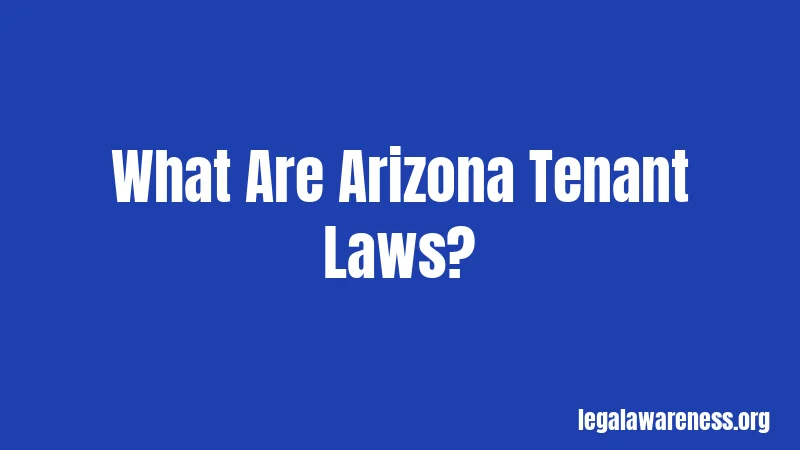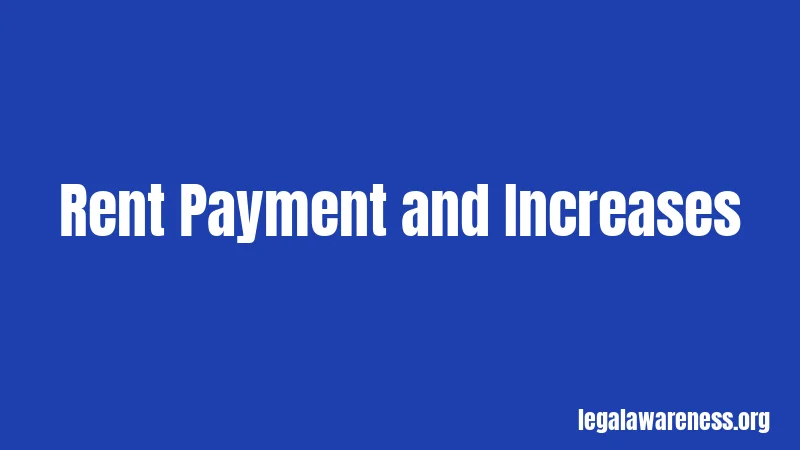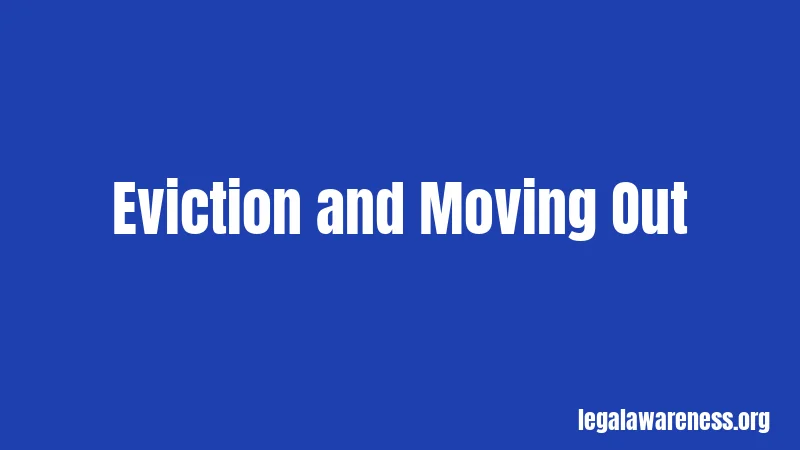Arizona Tenant Laws (2026): Rights and Responsibilities You Need to Know
You’re renting an apartment or house in Arizona. But here’s the thing: most renters have no idea what their actual rights are. Seriously. Arizona tenant laws can be strict, and both landlords and tenants need to follow specific rules. The good news? We’re going to break down exactly what you need to know.
Whether you’re signing a lease for the first time or dealing with a tricky landlord situation, understanding Arizona’s tenant laws protects you. Let’s walk through this together.
What Are Arizona Tenant Laws?

Arizona tenant laws are rules that protect both renters and landlords. These laws cover everything from how much notice a landlord must give before raising your rent to what repairs they must make. Pretty straightforward, right?
The main Arizona tenant laws are found in Arizona Revised Statutes Chapter 33 (the Arizona Residential Tenancy Act). This law applies to most rental situations in the state. It explains your rights, your landlord’s rights, and what happens if someone breaks the rules.
Think of these laws as a contract between you and your landlord. They protect you from unfair treatment. They also protect your landlord from problem tenants. Everyone wins when the rules are clear.
Basic Lease Requirements
What Must Be in Your Lease?
Arizona law requires certain information to be in every lease agreement. Your landlord must include the rent amount, the lease term, and the address of the rental property. They also need to list any move-in fees or deposits.
Here’s what you need to check: Does your lease clearly state the rent, how long you’re renting, and what deposits you’re paying? If something’s missing, ask your landlord to add it before you sign. Stay with me here because this part matters.
Your lease must also include contact information for your landlord or property manager. This is super important if you ever need to report a problem. You should always know exactly how to reach them.
Security Deposits: What’s Legal?
Your landlord can charge a security deposit. In Arizona, there’s no legal cap on how much they can ask for, but they can only use it for specific things. Not sure what counts as a valid use? Let me break it down.
Your landlord can use your deposit to cover unpaid rent, damage beyond normal wear and tear, and cleaning costs. They cannot use it for regular maintenance or normal aging of the property. Normal wear and tear is protected, meaning small scuffs or fading isn’t their right to charge you for.
Here’s the important part: Your landlord must return your deposit within thirty days of you moving out. They also need to give you an itemized list of any deductions. If they don’t, you could have a legal case against them.
Wondering if your landlord’s deduction was fair? If you think they wrongly kept your deposit, you have the right to take them to small claims court. Many people win these cases, so don’t just accept it if you believe it’s unfair.
Rent Payment and Increases

How Much Notice for Rent Increases?
Arizona law doesn’t set a maximum rent increase. Your landlord can raise rent as high as they want. But here’s where it gets interesting: they must give you at least thirty days’ notice before a rent increase takes effect.
That notice must be in writing. An email counts. A text message doesn’t. Make sure you have proof of when you received notice. This is your protection if a landlord tries to claim they told you about a raise they didn’t properly notify you about.
If you’re on a lease, your rent cannot increase until the lease ends. Month-to-month renters, though? That’s different. Your landlord can raise your rent with proper notice.
Late Fees and Rent Payment Rules
Your landlord can charge a late fee if you don’t pay rent on time. Arizona law allows them to charge a reasonable late fee, but it can’t be more than 5% of the monthly rent or $5, whichever is greater. So if your rent is $1,000, the late fee cannot exceed $50.
You must pay rent as stated in your lease. The lease usually specifies when and where to pay. If your landlord doesn’t give you a clear way to pay, that’s actually a problem on their end. Hold on, this part is important: you can’t just stop paying rent because of repair issues. That’s illegal in Arizona, even if your landlord isn’t making needed repairs.
Landlord Responsibilities and Repairs
Required Maintenance and Habitability
Your landlord has serious responsibilities. They must keep the property habitable. That means it has to be safe, clean, and functional. No exceptions.
Specifically, Arizona law requires your landlord to maintain structural components, plumbing, heating, and cooling systems. Electrical systems must work safely. Hot and cold water must be available. Windows and doors need to lock properly. The property must be free from pests.
Here’s where it gets real: if your landlord doesn’t make necessary repairs, you have options. You can give them written notice and give them a reasonable time to fix it. If they don’t fix it within that time, you can repair it yourself and deduct the cost from rent (called “repair and deduct”), or you can break your lease without penalty.
Many people assume this is legal. They find out the hard way it takes proper steps. Don’t be one of them. Follow the rules: give written notice, wait a reasonable time, then document everything.
Notice Requirements for Repairs
Your landlord must respond to repair requests. You should make your request in writing (email works). The landlord typically has seven to fourteen days to make non-emergency repairs. Emergency repairs must be handled faster.
What counts as an emergency? No heat in winter, no air conditioning in summer, no hot water, or a serious safety hazard. These must be fixed immediately. If your landlord ignores an emergency repair, you can hire someone to fix it and send your landlord the bill.
Honestly, this is the part most people miss: keep copies of everything. Save emails, texts, and photos. Document the problem and when you reported it. This proof protects you if you ever need to go to court.
Eviction and Moving Out

Legal Eviction Process
Okay, pause. Read this carefully because eviction rules are strict in Arizona.
Your landlord cannot just lock you out or throw your belongings outside. That’s illegal. They must follow a formal eviction process. First, they must give you proper written notice.
The notice period depends on the reason for eviction. For non-payment of rent, your landlord must give you five days’ written notice. For other lease violations, they must give you ten days’ notice. For month-to-month tenants, they must give thirty days’ notice to terminate the tenancy without cause.
After giving notice, if you don’t comply, your landlord files an eviction lawsuit. They must serve you legal papers. You then have a chance to respond in court. Only after a court orders your eviction can the landlord remove you. The entire process typically takes weeks.
Your landlord cannot retaliate against you for asserting your legal rights. If you report violations or request repairs, they cannot evict you as punishment. That’s illegal retaliation.
Protections Against Illegal Eviction
Arizona law gives you serious protections. Your landlord must follow the legal process exactly. If they skip steps, the eviction might be invalid.
You cannot be evicted without proper notice. You cannot be locked out without a court order. You cannot have your utilities shut off as punishment. Your landlord cannot remove your belongings. These are all illegal forms of eviction, and you can sue for damages.
Think of it like this: your rights are protected until a court says they’re not. Until that final eviction order, you have the right to stay and use the property.
Tenant Rights and Responsibilities
Your Basic Rights
You have the right to a habitable property. You have the right to have repairs made. You have the right to privacy (landlords must give twenty-four hours’ notice before entering your home, except emergencies). You have the right to quiet enjoyment of your rental.
You also have the right to organize. You can form a tenant association. You can communicate with other tenants about conditions. Landlords cannot punish you for this.
You cannot be discriminated against based on protected classes. Race, color, national origin, religion, sex, disability, and family status all have protections. If your landlord treats you differently because of these factors, that’s illegal.
Your Responsibilities
You must pay rent on time and in full. You must keep the property in good condition and clean. You cannot damage the property beyond normal wear and tear. You must follow all lease terms and Arizona law.
You must not disturb other tenants or neighbors. You must not have unauthorized people living in the unit. You must not use the property for illegal purposes. You must allow your landlord access for repairs with proper notice.
Here’s the key: your responsibilities are reasonable and straightforward. If you pay rent, keep the place clean, and follow the lease, you should be fine.
Deposits, Deductions, and Move-Out Issues
What Landlords Can and Cannot Deduct
Your landlord can deduct for unpaid rent, utilities, and damage beyond normal wear and tear. They can charge for professional cleaning if the unit is dirty beyond a reasonable standard. They cannot charge for normal maintenance or small imperfections.
Normal wear and tear includes faded paint, worn carpet, small nail holes, and minor scuffs. If these exist, your landlord cannot charge you. Damage means broken windows, large holes, broken appliances (that you broke), or stained carpet from spills.
Your landlord must provide an itemized list of deductions within thirty days. If they don’t provide this list, you can challenge the deductions in court. Many judges side with tenants when landlords fail to itemize properly.
Recovering Wrongfully Withheld Deposits
If your landlord wrongly withheld your deposit, you have options. First, request the deposit and documentation in writing. Many landlords will return it when confronted properly.
If they refuse, you can file in small claims court. Arizona courts take this seriously. If you win, your landlord must return the deposit plus interest. Some judges award additional damages for bad faith.
Document everything. Take photos of the unit when you move out. Keep the move-out inspection report. Save all communication with your landlord. This proof wins cases.
Arizona Lease Termination and Breaking a Lease
When You Can Break a Lease
Not sure what happens if you need to leave early? Breaking a lease is serious, but Arizona does allow it in certain situations.
You can break a lease if your landlord doesn’t maintain habitability. You can break it if the landlord retaliates against you. You can break it if you’re a victim of domestic violence (Arizona protects this). You can break it if the property is seized by the government.
Most other reasons for breaking a lease? You could owe the remaining rent. Your landlord has a legal obligation to try to find another tenant, though. They cannot just collect rent from you while the unit sits empty. This is called “mitigation of damages.”
If your landlord rents the unit to someone else, you stop owing rent. If they don’t try to rent it, you might still owe. But if you can prove they didn’t make a good faith effort to find tenants, you could win in court.
Notice Requirements for Moving Out
You must provide notice when you’re leaving. The amount depends on your lease. For month-to-month tenancies, you must give at least thirty days’ written notice. For fixed-term leases, you must give notice before the lease ends if you don’t want to renew.
Give notice in writing. Email works. Keep a copy. This protects you if your landlord later claims you didn’t notify them.
Rent Control and Fair Housing
Is There Rent Control in Arizona?
Arizona has no statewide rent control laws. Your landlord can raise rent to whatever they want, as long as they give proper notice. This is very different from other states that have strict limits on rent increases.
However, rent increases cannot be retaliatory. If you requested repairs or asserted your rights, your landlord cannot raise rent as punishment. That’s still illegal.
Some cities might have local protections. Phoenix, Tucson, and other cities sometimes have local ordinances. Check your city’s website to see if there are additional protections beyond state law.
Fair Housing Protections
Fair housing laws protect you from discrimination. Your landlord cannot refuse to rent to you, charge more rent, or treat you differently based on protected characteristics. These include race, color, national origin, religion, sex, disability, and family status.
Sexual orientation and gender identity are also protected in some circumstances. Arizona’s civil rights laws cover these categories. If you experience discrimination, you can file a complaint with the Arizona Department of Housing.
Retaliation is also prohibited. If you file a fair housing complaint or report code violations, your landlord cannot evict you or raise your rent as punishment. If they do, you have a legal case.
Personally, I think this law makes sense. Everyone deserves fair treatment, regardless of who they are.
Special Circumstances in Arizona
Military Members and Service Member Protections
Arizona provides extra protections for military members. The Servicemembers Civil Relief Act (SCRA) allows active duty service members to break leases early without penalty. You must provide military documentation and proper notice.
If you’re called to active duty, you can get out of your lease. This protects military families from financial hardship due to deployment.
Disability and Reasonable Accommodations
If you have a disability, you have the right to request reasonable accommodations or modifications to your rental unit. Your landlord must allow service animals and emotional support animals (with proper documentation). They cannot charge extra pet fees for service animals.
You can request modifications like grab bars, ramps, or other accessibility features. Your landlord must consider these requests. They cannot refuse based on disability. If they deny a reasonable request without good reason, that’s discrimination.
Manufactured Housing (Mobile Homes)
Mobile home renters have additional protections under Arizona law. Manufactured housing communities must follow different rules than regular rental properties. Rent increases must follow specific guidelines in many cases.
If you live in a manufactured housing community, research your community’s specific rules. Some have resident associations that protect your rights. These laws are a bit more complex, so reaching out to a legal aid organization might help.
Frequently Asked Questions
Can my landlord enter my apartment whenever they want? No. Arizona law requires landlords to give twenty-four hours’ written notice before entering. Emergencies (fire, gas leak, serious danger) are the only exception. Your right to privacy is protected.
What should I do if my landlord doesn’t return my security deposit? Request it in writing and give them seven days to respond. If they don’t, you can file in small claims court. Bring documentation, photos, and the lease agreement. Many people win these cases.
Can my landlord raise my rent without warning? They must give you thirty days’ written notice. If you’re on a lease, they cannot raise rent until it ends. On a month-to-month tenancy, they can raise it with proper notice, but not as retaliation for asserting your rights.
What is considered “normal wear and tear”? Small nail holes, faded paint, worn carpet, and minor scuffs are normal wear and tear. Your landlord cannot charge you for these. Broken windows, large holes, and damage from your negligence are not normal wear and tear.
How long can an eviction take in Arizona? It typically takes two to four weeks, depending on the reason. Your landlord must give notice first. Then they file in court. You have a chance to respond. Only a judge’s order allows removal. This timeline varies based on the specific situation.
Final Thoughts
Now you know the basics of Arizona tenant law. You have rights, but you also have responsibilities. Your landlord has obligations, but they also deserve respect.
Stay informed, document everything, and don’t hesitate to reach out for help if you need it. Many communities have legal aid organizations that help tenants for free. Arizona Tenants Advocates and local housing authorities can answer specific questions.
When in doubt, look it up, contact a tenant rights organization, or ask a lawyer. Your housing situation is important. Protect yourself by knowing your rights.
References
Arizona Revised Statutes Chapter 33: Arizona Residential Tenancy Act https://housing.az.gov/documents-links/arizona-residential-tenancy-act
Arizona Department of Housing https://housing.az.gov/
Arizona Tenants Advocates https://arizonatenantsadvocates.org/
Community Legal Services: Arizona Tenant Rights https://clsaz.org/get-help/housing/
Arizona Residential Tenancy Act Summary by Arizona Attorney General https://azag.gov/consumer/
Nolo Guide to Arizona Tenant Rights https://www.nolo.com/legal-encyclopedia/arizona-tenant-rights
Community Action Partnership: Arizona Tenant Resources https://www.communityactionpartnership.org/
Fair Housing Arizona https://housing.az.gov/documents-links/fair-housing
